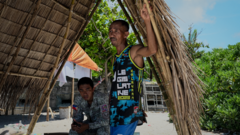On the remote island of Pagasa, known as "hope," the 300 inhabitants engage in daily life while standing resilient against encroaching Chinese maritime power. This small island, controlled by the Philippines and measuring just 37 hectares, exists amid a daunting backdrop of Chinese naval and coastguard vessels—over 20 were spotted just off-shore.
Despite the daunting presence of China's maritime militia in the South China Sea, which has systematically claimed submerged reefs and constructed military installations, Pagasa retains its significance to the Philippines. The island offers a rare community of civilians in contrast to other contested territories, reinforcing Manila's legal claim under international law as it generates its own territorial sea.
Jonathan Malaya, a representative from the Philippines National Security Council, emphasizes Pagasa's importance: "It has a runway. It supports life and has a resident Filipino community." Recent infrastructure improvements, including a newly lengthened runway and a facility for larger aircraft, enhance supply routes from the mainland, though accessing Pagasa remains challenging due to frequent storms.
The island has a history linked to Taiwan, which the Philippines seized in 1971. While modern amenities have slowly arrived, including electricity and mobile connectivity, the residents still rely heavily on government provisions for survival. Fishermen like Larry Hugo recount experiences of intimidation from Chinese ships, which now force them to fish within tighter boundaries.
Educator Realyn Limbo treasures the island's calm atmosphere, stating, "To me this island is like paradise," despite its unique challenges, including medical evacuations during crises. The community demonstrates resilience while cherishing their tranquil lifestyle amidst the looming threat of neighboring Chinese military operations.
The Philippine government maintains a proactive stance, lodging weekly formal diplomatic protests against Chinese wiggles into what it considers territorial waters. Malaya believes this assertive approach will lead to greater respect from China, signaling the importance of upholding sovereignty in an evolving geopolitical landscape.

















